一般过去时与现在完成时的区别
一般过去式与现在完成时的区别
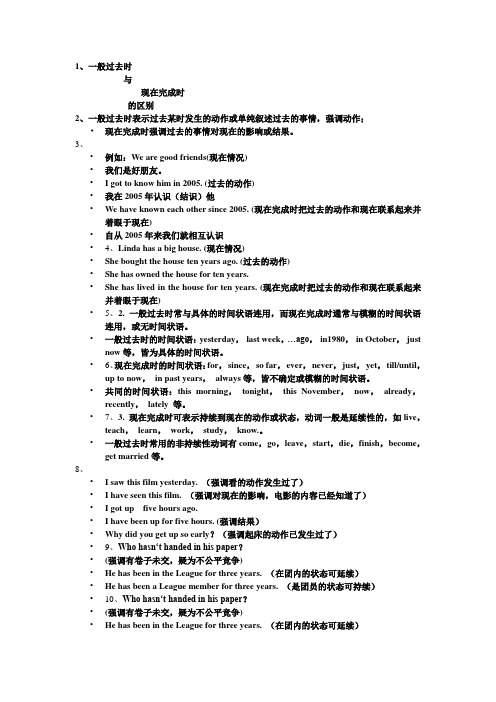
1、一般过去时与现在完成时的区别2、一般过去时表示过去某时发生的动作或单纯叙述过去的事情,强调动作;•现在完成时强调过去的事情对现在的影响或结果。
3、•例如:We are good friends(现在情况)•我们是好朋友。
•I got to know him in 2005. (过去的动作)•我在2005年认识(结识)他•We have known each other since 2005. (现在完成时把过去的动作和现在联系起来并着眼于现在)•自从2005年来我们就相互认识•4、Linda has a big house. (现在情况)•She bought the house ten years ago. (过去的动作)•She has owned the house for ten years.•She has lived in the house for ten years. (现在完成时把过去的动作和现在联系起来并着眼于现在)•5、2. 一般过去时常与具体的时间状语连用,而现在完成时通常与模糊的时间状语连用,或无时间状语。
•一般过去时的时间状语:yesterday,last week,…ago,in1980,in October,just now等,皆为具体的时间状语。
•6、现在完成时的时间状语:for,since,so far,ever,never,just,yet,till/until,up to now,in past years,always等,皆不确定或模糊的时间状语。
•共同的时间状语:this morning,tonight,this November,now,already,recently,lately 等。
•7、3. 现在完成时可表示持续到现在的动作或状态,动词一般是延续性的,如live,teach,learn,work,study,know.。
•一般过去时常用的非持续性动词有come,go,leave,start,die,finish,become,get married等。
现在完成时与一般过去时的区别
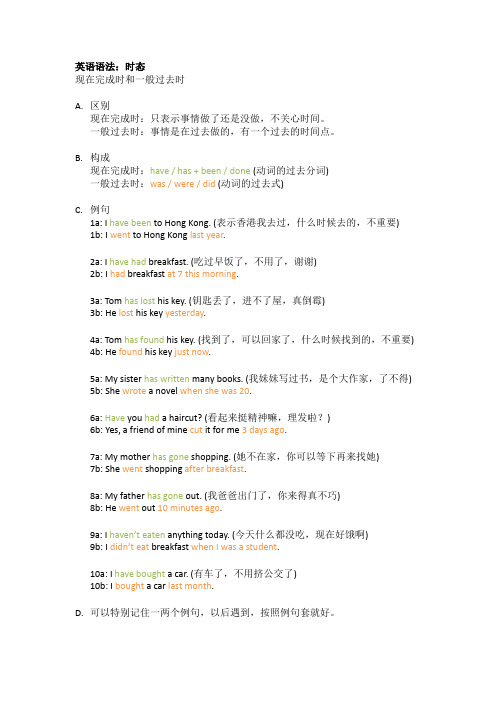
英语语法:时态现在完成时和一般过去时A.区别现在完成时:只表示事情做了还是没做,不关心时间。
一般过去时:事情是在过去做的,有一个过去的时间点。
B.构成现在完成时:have / has + been / done (动词的过去分词)一般过去时:was / were / did (动词的过去式)C.例句1a: I have been to Hong Kong. (表示香港我去过,什么时候去的,不重要) 1b: I went to Hong Kong last year.2a: I have had breakfast. (吃过早饭了,不用了,谢谢)2b: I had breakfast at 7 this morning.3a: Tom has lost his key. (钥匙丢了,进不了屋,真倒霉)3b: He lost his key yesterday.4a: Tom has found his key. (找到了,可以回家了,什么时候找到的,不重要) 4b: He found his key just now.5a: My sister has written many books. (我妹妹写过书,是个大作家,了不得) 5b: She wrote a novel when she was 20.6a: Have you had a haircut? (看起来挺精神嘛,理发啦?)6b: Yes, a friend of mine cut it for me 3 days ago.7a: My mother has gone shopping. (她不在家,你可以等下再来找她)7b: She went shopping after breakfast.8a: My father has gone out. (我爸爸出门了,你来得真不巧)8b: He went out 10 minutes ago.9a: I haven’t eaten anything today. (今天什么都没吃,现在好饿啊)9b: I didn’t eat breakfast when I was a student.10a: I have bought a car. (有车了,不用挤公交了)10b: I bought a car last month.D.可以特别记住一两个例句,以后遇到,按照例句套就好。
现在完成时和一般过去时的区别
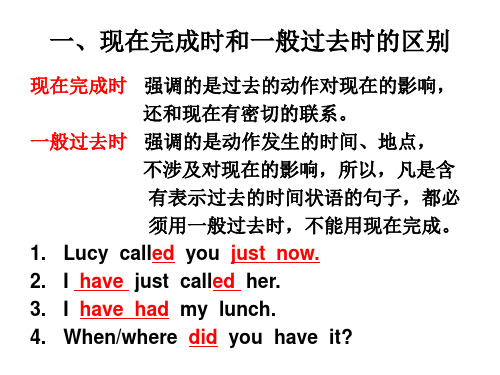
2. I arrived in Beijing half an hour ago.
--- I have been in Beijing for half an hour.
--- It is half an hour since I arr来自ved in Beijing.
--- It has been half an hour since I arrived in Beijing.
三年前我就认识他了. 5.
我认识他有三年了. I got to know him 3 years ago. I have known him for 3 years.
6. 这公司一年前倒闭了. 这公司倒闭已有一年了. The company closed one year ago. The company has been closed for one year.
一、现在完成时和一般过去时的区别
现在完成时 强调的是过去的动作对现在的影响, 还和现在有密切的联系。
一般过去时 强调的是动作发生的时间、地点, 不涉及对现在的影响,所以,凡是含 有表示过去的时间状语的句子,都必 须用一般过去时,不能用现在完成。
1. Lucy called you just now. 2. I have just called her. 3. I have had my lunch. 4. When/where did you have it?
come back---be back go there---be there come here—be here marry---be married
begin/start---be on open---be open(adj.) fall ill---be ill fall asleep/ill/sick--be asleep/ill/sick
现在完成时和一般过去时的比较
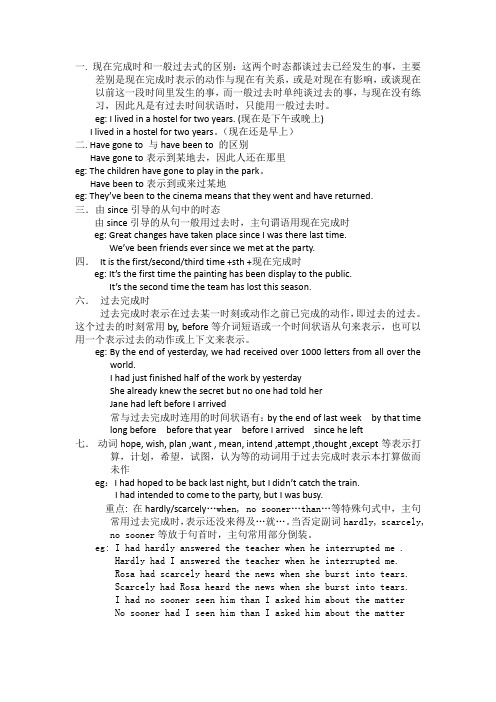
一. 现在完成时和一般过去式的区别:这两个时态都谈过去已经发生的事,主要差别是现在完成时表示的动作与现在有关系,或是对现在有影响,或谈现在以前这一段时间里发生的事,而一般过去时单纯谈过去的事,与现在没有练习,因此凡是有过去时间状语时,只能用一般过去时。
eg: I lived in a hostel for two years. (现在是下午或晚上)I lived in a hostel for two years。
(现在还是早上)二. Have gone to 与have been to 的区别Have gone to表示到某地去,因此人还在那里eg: The children have gone to play in the park。
Have been to表示到或来过某地eg: They’ve been to the cinema means that they went and have returned.三.由since引导的从句中的时态由since引导的从句一般用过去时,主句谓语用现在完成时eg: Great changes have taken place since I was there last time.We’ve been friends ever since we met at the party.四.It is the first/second/third time +sth +现在完成时eg: It’s the first time the painting has been display to the public.It’s the second time the team has lost this season.六.过去完成时过去完成时表示在过去某一时刻或动作之前已完成的动作,即过去的过去。
这个过去的时刻常用by, before等介词短语或一个时间状语从句来表示,也可以用一个表示过去的动作或上下文来表示。
现在完成时与一般过去时区别
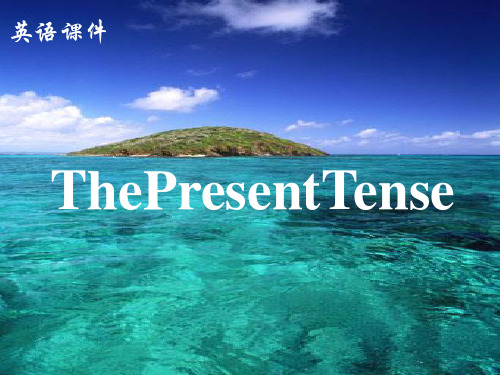
三.表示人曾有过或到目前为止从未有过的经历.
eg:1. Have you ever been to the Summar Palace?
你曾去过颐和园吗?
2. I have never had a car.
我从未有过汽车。
四.现在完成时还常与句型 This is the first time…,It’s the first time …连用。
eg:1.This is the first time he has driven a car .
这是他第一次开车。 五.现在完成时和最高级连用表示到现在为止是最…的。
What a boring film!
一部多么令人厌烦的电影啊!
It’s the most boring film I’ve ever seen.
microscopes.
A.saved
B.have saved
C.has saved D.were saving
6.I was so happy to see John again
last Sunday ,We ______each other
for more than two years.
A.haven’t seen B.hadn’t seen
我已经完成了家作。
二.表示从过去某一时刻开始并一直延续到现在的动作 或事情,但动作或事情可能仍在继续。
eg:1. I want to see how much the place changed
since
I saw it last.
我想看看从上次见到那地方以来它发生了多大变化。
2. I have learnt English for more than ten years.
英语现在完成时与一般过去时的区别
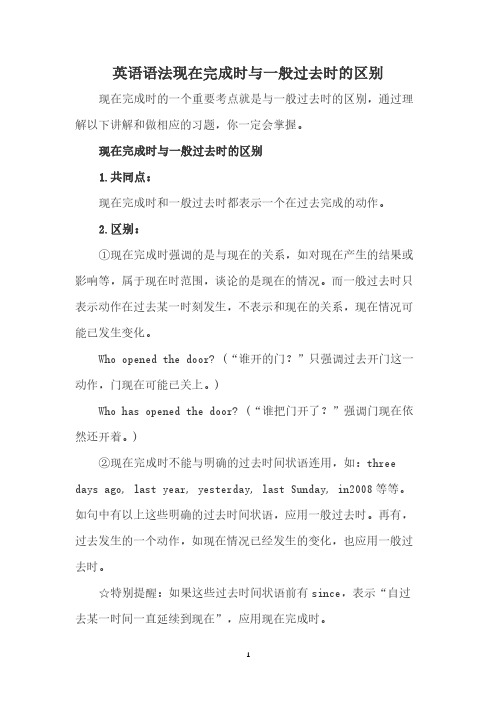
英语语法现在完成时与一般过去时的区别现在完成时的一个重要考点就是与一般过去时的区别,通过理解以下讲解和做相应的习题,你一定会掌握。
现在完成时与一般过去时的区别1.共同点:现在完成时和一般过去时都表示一个在过去完成的动作。
2.区别:①现在完成时强调的是与现在的关系,如对现在产生的结果或影响等,属于现在时范围,谈论的是现在的情况。
而一般过去时只表示动作在过去某一时刻发生,不表示和现在的关系,现在情况可能已发生变化。
Who opened the door? (“谁开的门?”只强调过去开门这一动作,门现在可能已关上。
)Who has opened the door? (“谁把门开了?”强调门现在依然还开着。
)②现在完成时不能与明确的过去时间状语连用,如:three days ago, last year, yesterday, last Sunday, in2008等等。
如句中有以上这些明确的过去时间状语,应用一般过去时。
再有,过去发生的一个动作,如现在情况已经发生的变化,也应用一般过去时。
☆特别提醒:如果这些过去时间状语前有since,表示“自过去某一时间一直延续到现在”,应用现在完成时。
He finished reading the book the day before yesterday.I put my ruler in my pencil-box, but I can’t find it now.My cousin has been in Nanjing since 2009.③现在完成时不与when引导的特殊疑问句连用,when后只用一般过去时表示已发生的动作。
但现在完成时可与where, why等疑问词连用。
如:Where have you been? (你去过哪里了?) --The train has left.--When did the train leave?④since引导的时间状语从句后面用一般过去时,只有前面的主句才用现在完成时。
现在完成时和一般过去时的区别
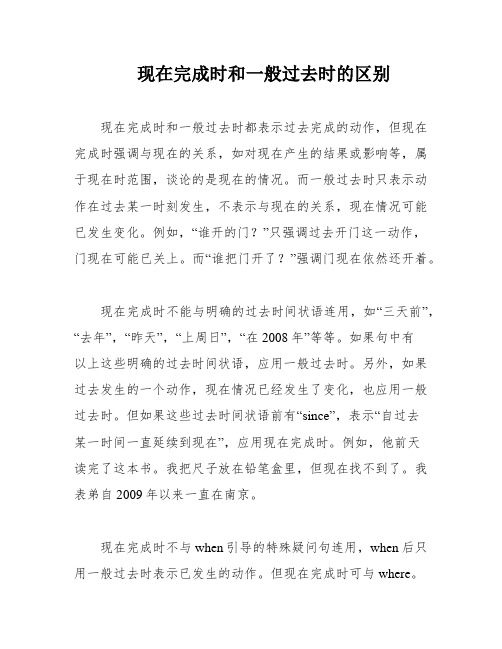
现在完成时和一般过去时的区别现在完成时和一般过去时都表示过去完成的动作,但现在完成时强调与现在的关系,如对现在产生的结果或影响等,属于现在时范围,谈论的是现在的情况。
而一般过去时只表示动作在过去某一时刻发生,不表示与现在的关系,现在情况可能已发生变化。
例如,“谁开的门?”只强调过去开门这一动作,门现在可能已关上。
而“谁把门开了?”强调门现在依然还开着。
现在完成时不能与明确的过去时间状语连用,如“三天前”,“去年”,“昨天”,“上周日”,“在2008年”等等。
如果句中有以上这些明确的过去时间状语,应用一般过去时。
另外,如果过去发生的一个动作,现在情况已经发生了变化,也应用一般过去时。
但如果这些过去时间状语前有“since”,表示“自过去某一时间一直延续到现在”,应用现在完成时。
例如,他前天读完了这本书。
我把尺子放在铅笔盒里,但现在找不到了。
我表弟自2009年以来一直在南京。
现在完成时不与when引导的特殊疑问句连用,when后只用一般过去时表示已发生的动作。
但现在完成时可与where。
why等疑问词连用。
例如,“你去过哪里了?”——“火车已经开走了。
”——“火车什么时候开的?”since引导的时间状语从句后面用一般过去时,只有前面的主句才用现在完成时。
例如,我们自两年前来到这所学校就认识了彼此。
有些时间状语,如“今天早上”,“这个月”,“今晚”等,既可以与一般过去时连用,又可以与现在完成时连用,但内涵不同。
与一般过去时连用时,表示与“现在”无关,时间已成为过去。
而与现在完成时连用,则表示包括“现在”在内。
I saw him this morning。
(时间已不在上午了。
)改写:XXX.He lived in New York for eight years。
(他现在已经不在纽约住了。
)删除:无需删除改写:He used to live in New York for eight years.动词填空:1.saw2.Did。
一般过去时与现在完成时区别
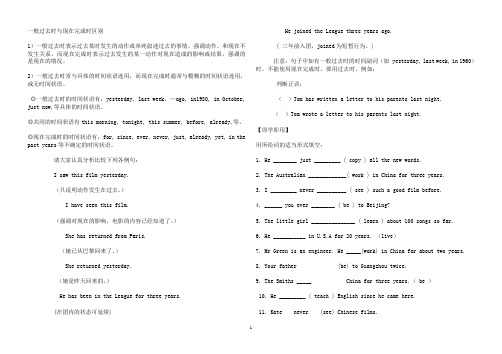
一般过去时与现在完成时区别1)一般过去时表示过去某时发生的动作或单纯叙述过去的事情,强调动作,和现在不发生关系。
而现在完成时表示过去发生的某一动作对现在造成的影响或结果,强调的是现在的情况。
2)一般过去时常与具体的时间状语连用,而现在完成时通常与模糊的时间状语连用,或无时间状语。
◎一般过去时的时间状语有:yesterday, last week,…ago, in1980, in October, just now,等具体的时间状语。
◎共同的时间状语有this morning, tonight, this summer, before, already,等。
◎现在完成时的时间状语有:for, since, ever, never, just, already, yet, in the past years等不确定的时间状语。
请大家认真分析比较下列各例句:I saw this film yesterday.(只说明动作发生在过去。
)I have seen this film.(强调对现在的影响,电影的内容已经知道了。
)She has returned from Paris.(她已从巴黎回来了。
)She returned yesterday.(她是昨天回来的。
)He has been in the League for three years.(在团内的状态可延续) He joined the League three years ago.( 三年前入团,joined为短暂行为。
)注意:句子中如有一般过去时的时间副词(如 yesterday, last week, in 1960)时,不能使用现在完成时,要用过去时。
例如:判断正误:()Tom has written a letter to his parents last night.()Tom wrote a letter to his parents last night.【即学即用】用所给词的适当形式填空:1. He ________ just _________ ( copy ) all the new words.2. The Australian _____________( work ) in China for three years.3. I _________ never __________ ( see ) such a good film before.4. ______ you ever ________ ( be ) to Beijing?5. The little girl _______________ ( learn ) about 100 songs so far.6. He ___________ in U.S.A for 20 years. (live)7. Mr Green is an engineer. He _____(work) in China for about two years.8. Your father (be) to Guangzhou twice.9. The Smiths _____ China for three years.( be )10. He _________ ( teach ) English since he came here.11. Kate never (see) Chinese films.12. -----Ann has gone to Shanghai.-----So ______her parents.A. hasB. hadC. didD. have13. I______ a letter from him since he left. ( get )14. They ____ just_______( close )the windows.15. I______ (return) the book to the library already.16. She never (meet) a foreigner before.17. I_____________ ( know ) Jim for three years.18. How many songs ________ they___________ by now? ( learn)19. My father________( be )to the Great Wall before.20. Mr. Smith___________ ( live ) in London since 1979.21. Recently Mary __________ ( do ) her work regularly.22. He______________( stay ) here since 3 hours ago.23. She __________ ( learn ) about 30,000 words in the past three years.四、英语动词根据词义可分为两种,一种是延续性的,一种是终止性的,终止性动词(也可称为非延续性动词,瞬间动词,或点动词),如begin, start, die, buy, leave, come 等,表示动作的发生与结束于一瞬间完成,不能再延续,所以它的现在完成时不能和表示延续的时间状语连用,即不能与表示一段时间的状语,for+时间段, since+时间点/从句连用,也不能用在how long引导的特殊疑问句中.⑴.将时间状语改为时间段 + ago,句中谓语动词用一般过去时.eg.我弟弟参军两年了.My brother joined the army two years ago.== My brother has been in the army for two years.⑵若保留for+时间段,since+时间点/从句, 或用在 how long 句型中,则需将终止性动词改为相应的状态动词或延续性动词即学即用The movie began about 20 minutes ago.(同义句)The movie has ______________ for about 20 minutes.将瞬间动词转化为表延续的动词或者表状态的be+名词/形容词或副词/介词短语等。
- 1、下载文档前请自行甄别文档内容的完整性,平台不提供额外的编辑、内容补充、找答案等附加服务。
- 2、"仅部分预览"的文档,不可在线预览部分如存在完整性等问题,可反馈申请退款(可完整预览的文档不适用该条件!)。
- 3、如文档侵犯您的权益,请联系客服反馈,我们会尽快为您处理(人工客服工作时间:9:00-18:30)。
ago • They got married six months _____. • They has been married _______ six months. for • They have been married _____ 6 months ____. since ago • I first met Susan two years _____. ago • I have known Susan _____ two years. for • I have known Susan ______ two years ago. since • Sue is in the office. She‟s been there _____ three for hours. ago • Sue came to the office three hours _____. • Sue has been in the office _____ 3 hours ____. since ago
• Has the bell rung _____? yet
• Yes, It has ________ rung. already
• The computer has not been repaired ____. yet • We have _______ changed the plan because already yet Linda hasn‟t made up her mind ______. Have you ordered the takeaway food _____? yet • Yes. We have ________ ordered it. already
• He has been a League member for
three years. (是团员的状如
yesterday, last, week, in 1960)时,
不能使用现在完成时,要用过去时。 • 改错: • Tom has written a letter to his parents last night. saw • I have seen the film twice last month.
填上since ,for或者ago.
• James has been in Canada ______ Monday. since • James has been in Canada ______ four days. for • James came to Canada four days _____. ago
Fill in the blanks with the Present Perfect Tense:
1.I __________ in Shenzhen for about 15 years. have lived (live) 2. He ____________ here since 1998. (work) has worked 3. Bob isn‟t in. He_________ to the cinema. (go) has gone 4. I _________ to Australia three times. (be) have been 5. She ___________ English for about five years. has studied (study) has taught 6. She ___________ English since 1999. (teach)
( C) 5. You ____ here before, ____ you? A. never are, are B. never came, do C. have never been, have D. were never, were ( B ) 6. The doctor ____ to Beijing twice. A. has gone B. has been C. went D. goes ( A) 7. My mother has ___ made a big mooncake herself. A. already B. yet C. just D. always ( C) 8. -Mr Green is no longer working here. He ____ here for a month. A.has gone B. has left C. has been away from D. left
• for和since的运用 for表“经历(一段时间)”,而since表 “自从…… 以来”。
• 例如:
• 1. He has stayed here for 3 hours.
• 2. He has stayed here since 3 hours ago. 3. He has stayed here since 3 o‟clock. • 4.He has taught English since he came here.
• My aunt has lived in Brazil _____ 15 years. for ago • My aunt moved to Brazil 15 years _____. • She has lived in Brazil ______ 15 years ______. since ago • • • • Mike has been in hospital _______ October. since Mike has been in hospital ______ two months for ago Mike came to the hospital two months ______ He has been in hospital ______ two months ___ since ago
Multiple choice.
(D ) 1. – Has your brother found his lost car ____? - No, he hasn‟t. A. still B. already C. just D. yet ( D) 2. The visitors _____ here for a week. A. have left B. have come C. have arrived D. have been ( A) 3. Where ____ you _____ all these years, Jim? A. have, been B. did , be C. were, been D. did, stay ( B ) 4. I‟ve ____ this dictionary ____ a year. A. bought, for B. had, for C. bought, since D. had, since
• Linda has a big house. (现在情况) • She bought the house ten years ago. (过
去的动作)
• She has owned the house for ten years. • She has lived in the house for ten years. (现在完成时把过去的动作和现在联系起 来并着眼于现在)
• 共同的时间状语:this morning, tonight, this November, now, already, recently, lately 等。
• 3. 现在完成时可表示持续到现在的动作 或状态,动词一般是延续性的,如live, teach, learn, work, study, know.。
Fill in the blanks with “for” or “since”: 1.We have had the new computer _______ a week. for 2.How long have you studied English? I have studied English _______ I was five. since 3. How long has he taught in this school? He has taught in this school ______ 1998. since 4. How long have you known each other? We have known each other ______ over ten years for 5. How long have you kept your pet dog? I have kept it ______ two years ago. since I have kept it ______ two years. for
一般过去时
与 现在完成时 的区别
一般过去时表示过去某时发生的动作或 单纯叙述过去的事情,强调动作;
• 现在完成时强调过去的事情对现在的 影响或结果。
• 例如:We are good friends(现在情况)
•
•
我们是好朋友。
我在2005年认识(结识)他
• I got to know him in 2005. (过去的动作) • We have known each other since 2005. (现在完成时把过去的动作和现在联系 起来并着眼于现在) • 自从2005年来我们就相互认识。
• 一般过去时常用的非持续性动词有come, go, leave, start, die, finish, become, get married等。
• I saw this film yesterday. (强调看的动 作发生过了) • I have seen this film. (强调对现在的影 响,电影的内容已经知道了) • I got up five hours ago.
Fill in already or yet when needed
